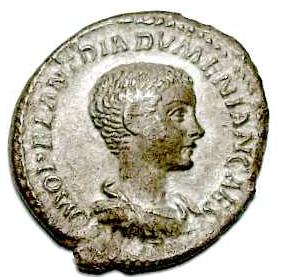Weird Birth Omen and the Youngest Roman Emperor September 10, 2013
Author: Beach Combing | in : Ancient , trackback***Thanks for David M for pointing out this fascinating piece***
Diadumenian was one of the unluckiest Roman emperors. He was made emperor by his father when he was about nine and he was dead within just over a year (obit 218), when one of those apparently endless third-century revolts pulled the rug from under his family. The Historia Augusta a rather questionable source begins by playing down Diadumenian’s Imperial credentials.
The life of the boy Antoninus Diadumenianus who, together with his father, Opellius Macrinus, was proclaimed emperor by the army when Bassianus had been slain through the treachery of Macrinus, contains nothing memorable, save that he received the name of Antoninus and that there befell him astonishing omens signifying that his reign would be but a short one – and so it really came to pass. (Antonini Diadumeni pueri, quem cum patre Opilio Macrino imperatorem dixit exercitus occiso Bassiano factione Macriniana, nihil habet vita memorabile, nisi quod Antoninus est dictus et quod ei stupenda omina sunt facta imperii non diutini, ut evenit.)
However, there was on interesting detail concerning his birth which relates to Beach’s recent interest in cauls.
Now let us proceed to the omens predicting his imperial power — which are marvellous enough in the case of others, but in his case beyond the usual wont. On the day of his birth, his father, who then chanced to be steward of the greater treasury, was inspecting the purple robes, and those which he approved as being brighter in hue he ordered to be carried into a certain chamber, in which two hours later Diadumenianus was born. Furthermore, whereas it usually happens that children at birth are provided by nature with a caul, which the midwives seize and sell to credulous lawyers (for it is said that this bring luck to those who plead), this child, instead of a caul, had a narrow band like a diadem, so strong that it could not be broken, for the fibres were entwined in the manner of a bow-string. (Nunc veniamus ad omina imperii, quae cum in aliis tum in hoc praecipue sunt stupenda. die qua natus est pater eius purpuras, tunc forte procurator aerarii maioris, inspexit et quas claras probavit in id conclave redigi praecepit in quo post duas horas Diadumenus natus est. solent deinde pueri pilleo insigniri naturali, quod obstetrices rapiunt et advocatis credulis vendunt, si quidem causidici hoc iuvari dicuntur. at iste puer pilleum non habuit sed diadema tenue, sed ita forte ut rumpi non poterit, fibris intercedentibus specie nervi sagittarii.)
What biological weirdness is this? drbeachcombing AT yahoo DOT com It sounds like it might be part of the umbilical or perhaps the caul had rolled up and become caught on part of the Emperor to be? Note too the reference to lawyers wanting cauls: this tradition continued into the nineteenth century. For those interested in legal superstitions compare with the druid’s egg, another case-winner.
11 Sept 2013: Tacitus from Detritus writes in: Enjoyed the post on this ill starred lad. Although I had wondered about his name I never made the connection between it and “diadem”. My vote is for a mild version of Amniotic Band Syndrome. A randomly occurring condition where a constricting ring of amniotic membrane wraps snugly around a part of the fetus. Commoner versions include fingers and toes either wrapped together and fused or neatly amputated ante natum. I see no reason why a looser band around the forehead might not have left a slight crease…. I do not see any such marking on his coinage which is surprisingly common given the brevity of his career. But one imagines the story has some basis, and would anybody but the midwives have been present at birth? It hardly seems the sort of thing our austere and stoic Roman forefathers would have gone in for. Total fabrication is another equally viable theory.’ Thanks Invisible and Tacitus!



